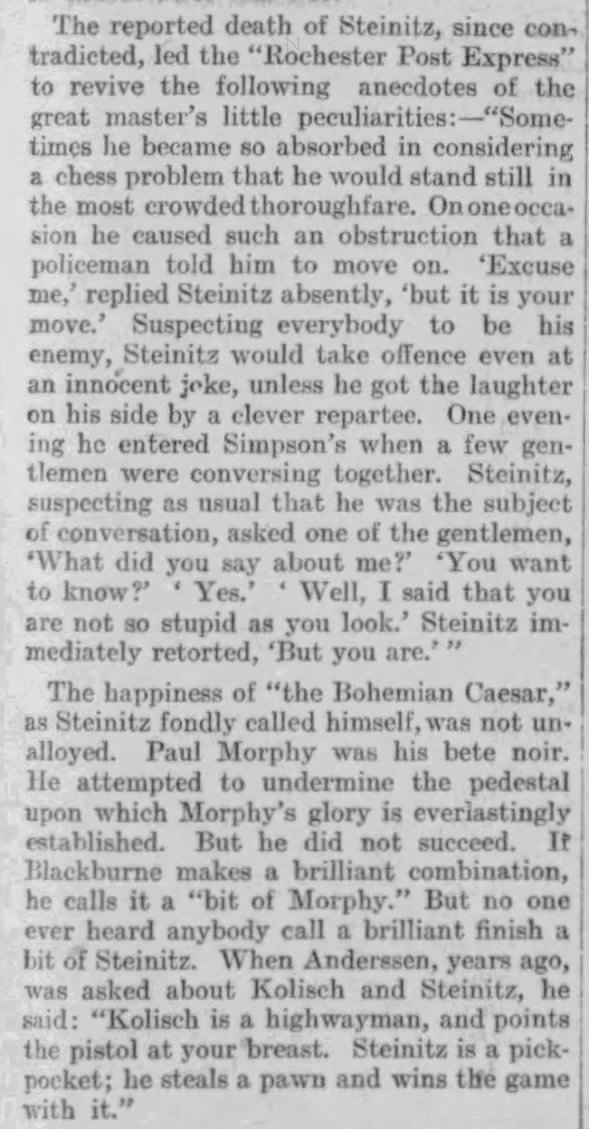They will claim that the “problem” with the great chess genius Paul Morphy was “all in his head,” but the radical factions of the White Supremacist Imperialists of the United States, North vs. South, were tearing each other apart during the Civil War with Morphy as a pawn to be torn between them. Morphy's actions proved he was neither supportive of the South nor the North, for early during the war, he slipped his way back to Havana, Cuba and then into Paris, France, refusing to participate in a senseless war that had nothing to do with ending slavery — but everything to do with Racist White man's dominating grasp on absolute power in Washington, DC. News reports demonstrate the close associates of Paul Morphy utterly deny Morphy was in any way connected as a “bitter secessionist,” or any of the other sordid rumors dripping in vitriol, invented and circulated by vindictive editorials from Northern Newspapers.
As the tragic smear campaign was still underway by overzealous Union fanatics in 1864, efforts were also made by loyal friends in behalf of Morphy to counter the false reports and clear Mr. Morphy's name. After doing so, Mr. Morphy ONCE AGAIN attempted to resume his chess activities in New York and Washington, D.C.!! but only to find himself threatened by former Northern chess associates whom, making a long story short, verbalized their intent to ruin his celebrity status and drive him into obscurity from chess.
Mr. Morphy, upon seeing he was unwelcomed in Northern chess circles, returned to New Orleans by the end of 1865. Two years later, after the rumors and campaign of defamation had seemingly quieted down, in 1867-1868, invitation was extended to Morphy to attend the Paris Chess Congress, and from there, the smear factory went into full swing, again, starting with these foul rumors purposely circulated in syndicated press to target Mr. Morphy's prowess as a chess player. As one can see, the ‘problem’ does not rest within Morphy, but persons in the chess world from the United States and to some extent, worldwide.
It was after his trip to Paris and further defamation that ensued, including biting reports that Morphy supposedly “cheated” a certain Lichtenhein during match play, further besmirching the honor and integrity of Mr. Morphy's character and gamesmanship, that Morphy publicly states he shall NEVER participate in any public chess exhibition, again.
Those who attempt to rewrite history, and cover up their predecessor's misdeeds, devious schemes and political plots, may claim “Mr. Morphy lost his mind,” or “Mr. Morphy simply retired without a shred of reasoning,” these contemporary reports will not be ignored now that we have recovered them, and the world can better understand the circumstances and predicament forced upon the great Paul Morphy.
(Defamatory syndicated report to belittle Morphy's chess abilities) The New Orleans Crescent New Orleans, Louisiana Friday, March 13, 1868 — The chess champion of the world, Paul Morphy, has emerged from his retirement. He played, in Paris, four games with Mr. Steinitz, losing one and drawing three. (just one of many syndicated reports published and put into circulation and made its rounds, nationally).
Thus came this reactionary report to the defense of Mr. Morphy:
The Times-Democrat, New Orleans, Louisiana, Sunday, March 15, 1868 — It is stated that Mr. Paul Morphy, the chess champion, recently played in Paris four games, beating his opponent, Mr. Steinitz, in each game.
The Era London, Greater London, England Sunday, March 15, 1868 — Mr. Paul Morphy. — The following, for the truth of which we cannot vouch, is taken from Wilkes (New York) Spirit of the Times. If true, we shall be glad to see the games:— “Chess In Paris.—It gives us much pleasure to announce that the champions of the world, Mr. Paul Morphy, has emerged from his retirement. Rumour says that he has played four games with Mr. Steinitz, losing one and drawing three. It is impossible that he will remain satisfied with that result with a player who was beaten by Mr. Kolisch at the Paris Tournament; therefore, we confidently expect to see him contest a series of games either with Mr. Steinitz, or some other chess champion of equal strength, without fear that the laurels which he has earned will be wrested from him.”
“The happiness of “the Bohemian Caesar,” as Steinitz fondly called himself, was not unalloyed. Paul Morphy was his bête noire. He attempted to undermine the pedestal upon which Morphy's glory is everlastingly established. But he did not succeed. If Blackburne makes a brilliant combination, he calls it a “bit of Morphy.” But no one ever heard anybody call a brilliant finish a bit of Steinitz…”
— The Age Melbourne, Victoria, Australia Saturday, June 19, 1897
























